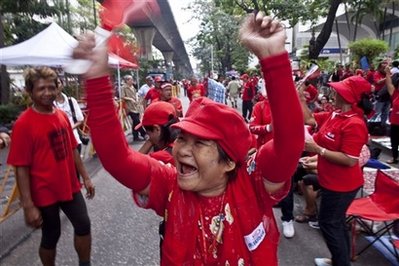Thaksin ruling could further enflame Thai unrest
BANGKOK: A court ruling on whether Thailand's deposed leader Thaksin Shinawatra should lose his fortune for alleged corruption could become the latest flash point in four years of sometimes-violent political unrest that has exposed deep divisions in Thai society.
The government of Prime Minister Abhisit Vejjajiva is hoping Friday's decision will lead to a return of stability, but it has hedged its bets, imposing a security crackdown around the country and offering safe houses for the court's judges, claiming the pro-Thaksin "Red Shirt" movement may be planning violence.
Political passions have led to years of off-and-on street protests, pitting those who view Thaksin as a corrupt demagogue who bought his way to power against those who benefited from his populist policies and see the military coup that ousted him in September 2006 as a grave injustice orchestrated by a ruling elite scared of change.
The refusal by Thaksin's opponents to accept the results of post-coup elections that saw his allies return to power led to their occupation of the seat of government for several months and seizure of the capital's two airports for a week in 2008. A court ruling that led to the fall of the pro-Thaksin government and Abhisit taking power through parliamentary maneuverings fueled the ire of the Red Shirts, who last year rioted and disrupted a conference of Asian heads of government.
Now, says government spokesman Panitan Wattanayagorn, "People expect the system to resume functioning normally, the parliamentary system and the economic system. Although we continue to have political differences, the wishes of the people are clear."
Actual evidence of a return to normalcy is slim. Red Shirt leaders boast of plans for a "million-man march" sometime after the verdict. State television nightly broadcasts dire warnings of the nefarious intentions of Thaksin and his followers, repeatedly showing footage of Red Shirt rioting last April that had to be quashed by the army. Newspapers publish endless speculation about a coup in the offing.
The Supreme Court will rule on whether Thaksin, a telecommunications mogul, illegally parked his fortune with family members because he was not allowed to hold company shares while prime minister and whether his 2001-2006 governments implemented policies to benefit his businesses.
If it finds Thaksin guilty — the almost universal assumption is that it will — the court will also decide whether to seize some or all of the $2.29 billion chunk of the family fortune frozen in Thai banks.
For Thaksin's opponents, says political scientist Thitinan Pongsidhirak of Bangkok's Chulalongkorn University, the case marks "the final act of Thaksin's political decapitation, on the premise that the Red Shirts, the instability, are all because of Thaksin, plus his money, his corruption, manipulation and abuses of power."
"The bottom line is: Are these Reds really about something more than Thaksin? His opponents will say 'No, They're all because of Thaksin.' Instead of saying that the Red Shirts have genuine grievances. Instead of acknowledging that they exist, listening to them."
Such a state of denial, he warns, only intensifies their movement.
Thaksin's supporters say the charges against him are an outrage, part of a vendetta carried out by a ruling class that felt threatened by their hero's popularity — he won two landslide election victories — and is determined to prevent his comeback.
Thaksin — who denies all the charges against him — fled into exile ahead of a 2008 conflict of interest conviction that resulted in a two-year jail sentence. As he trots the globe cutting business deals, he sends his followers messages — on blogs, through Twitter and by video — bemoaning his fate and exhorting them to keep up the fight.
Opponents say Thaksin was a megalomaniacal crook of unbounded greed, who also sought to usurp the power of the country's revered constitutional monarch, King Bhumibol Adulyadej.
His supporters, primarily from the country's poor rural majority, which benefited from Thaksin's innovative social welfare programs, feel robbed of their democratic birthright.
But the Red Shirt movement also encompasses many who while not necessarily Thaksin supporters, feel the coup and subsequent court rulings against his allies are symptoms of greater injustices in Thai society, which has long been dominated by those with ties to the military and palace.
Friends and foes of Thaksin alike doubt the court verdict will clear the air.
The Red Shirts — nicknamed for their attire but formally called the United Front of Democracy Against Dictatorship — "have been fighting against dictatorship for three years and we will keep on fighting," says one of their leaders, veteran politician Veera Musigapong.
Whether Thaksin's money is seized in whole or in part, or released, is irrelevant to the group, he says. "Our political gatherings will continue, according to our plan to bring back democracy and to overthrow the current government."
A prominent Thaksin critic thinks a guilty verdict will erode the former prime minister's legitimacy with the public, but not end the schisms in Thai society.
"Even if the assets are seized, the conflict will continue," says Suriyasai Katasila of the People's Alliance for Democracy, the group that has been the public face of the anti-Thaksin movement. "Thaksin will carry out his revenge against his opponents. The clashes of opinions will persist and are not likely to cease for the next couple of years."






